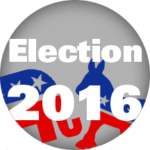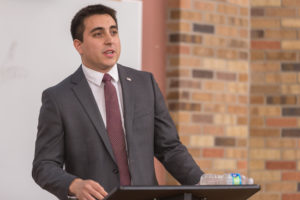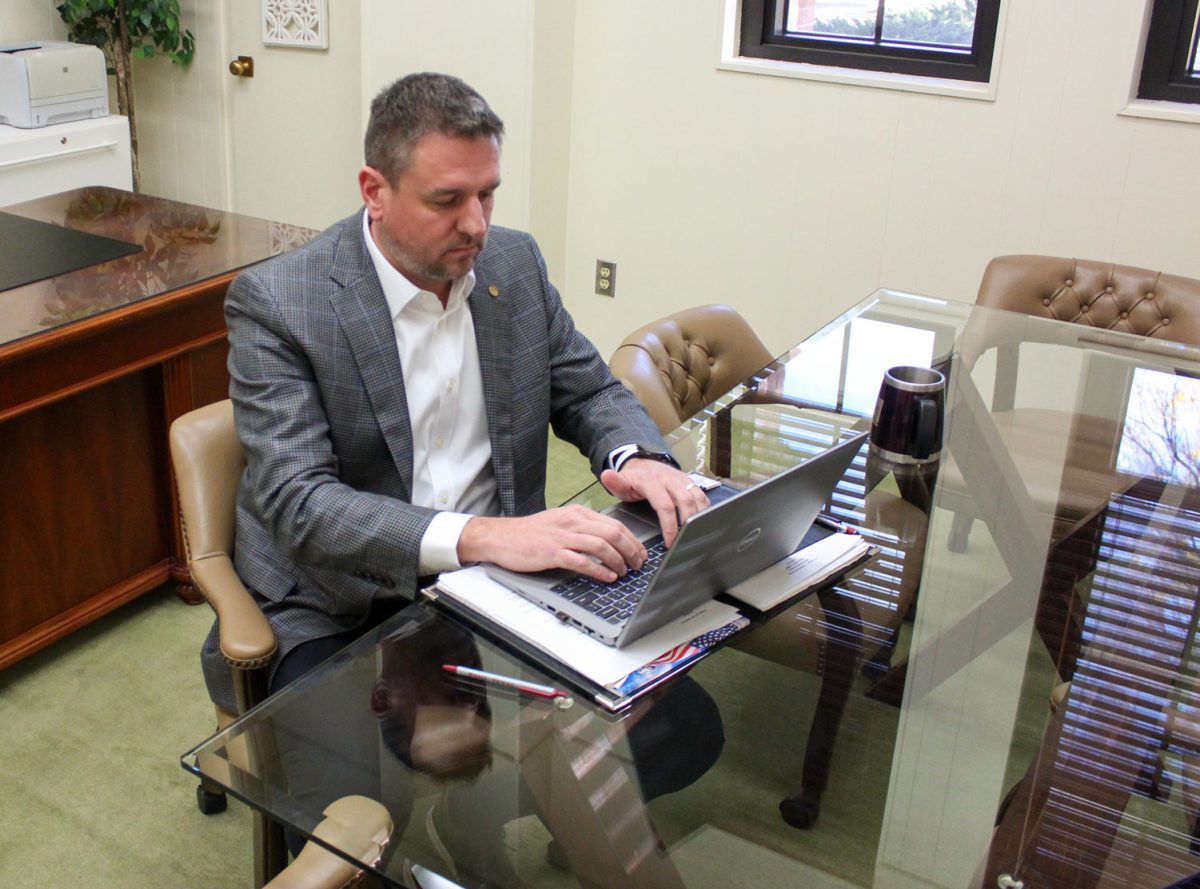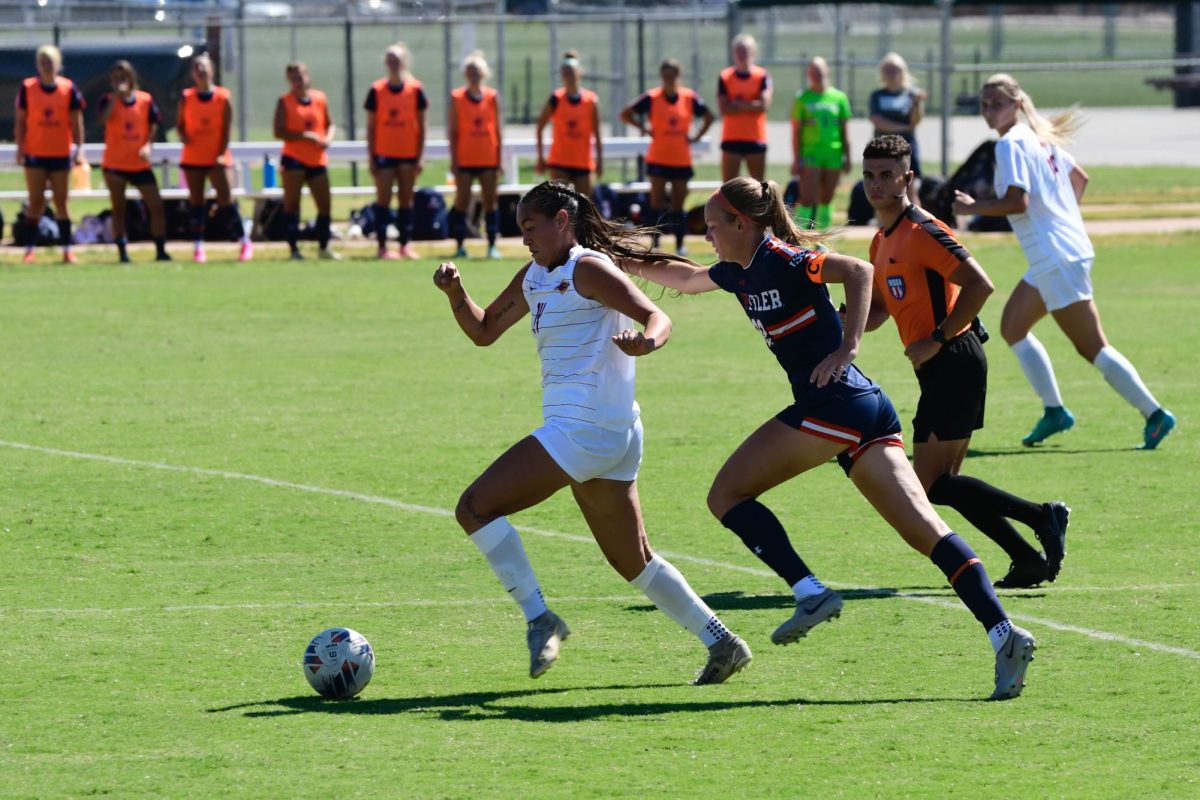 Even though the race to the White House has come to an end, the issues faced by both parties aren’t going away anytime soon. Manny Hoffmann, political science junior, and Marco Torres, history senior, the two students who took the Republican and Democratic stances at the student debate, have their own thoughts on the different stereotypes faced by both political parties, and what impact they have on elections.
Even though the race to the White House has come to an end, the issues faced by both parties aren’t going away anytime soon. Manny Hoffmann, political science junior, and Marco Torres, history senior, the two students who took the Republican and Democratic stances at the student debate, have their own thoughts on the different stereotypes faced by both political parties, and what impact they have on elections.

Manny Hoffmann
Q: What kind of stereotypes do Republicans face?
A: “You see all the time that Republicans are the ‘anti-gay’ or ‘racist’ party, which is something Democrats have really been able to capitalize on, in this election, specifically. Especially since Republicans have as polarizing a candidate as they do right now, in Donald Trump, it really hasn’t helped them in that regard. Many times, you’ll hear Republicans be called ‘misogynistic,’ and I think those are really the main three. There’s plenty, but those are the three that I believe to be most common.”
Q: How do these stereotypes affect elections?
A: “The problem with stereotypes is that it is so easy to isolate an entire demographic. We saw it early in the election, with Donald Trump. The Hispanic community really pushed back after the mention of ‘the wall.’ By no means am I defending Donald Trump, but it just goes to show how easy it is to rally an entire community or culture against or for a certain candidate with just one word.”
Q: Do any of these stereotypes hold any truth? Why or why not?
A: “I’d say to some degree, there’s probably truth. I wouldn’t say the party endorses these qualities. But individuals within the party, too often, validate it, whether they do it consciously, or not. For example, I don’t think the Republican party is necessarily ‘anti-gay,’ but all it takes is that one individual to say something and the media will capitalize, ultimately leaving that homophobic brand on the party. It reflects poorly on the party as a whole.”
Q: How do Republicans overcome these kinds of stereotypes?
A: “If you read the platform, there’s no mention of hate or hateful language. But the average American isn’t going to sit down and read the Republican platform. So, when your leading candidate is almost exemplifying these kinds of things, it’s only adding fuel to that fire. It’s only when candidates start stepping up and showing that this is not what the party’s about that they can start to form an argument against these stereotypes.”
Q: Do you think that Donald Trump personifies any of these stereotypes?
A: “In some regards, I have to say he does. He’s made his intentions with ‘the wall’ quite clear, and he’s certainly said more than a few things that can be deemed misogynistic.”
Q: What kind of stereotypes do Democrats face?
A: “I’ve heard Democrats referred to as ‘baby-killers,’ ‘tree-huggers,’ and ‘pacifists.’ I’d say that’s the main three. It doesn’t matter whether or not you agree with another party’s policies, though. It doesn’t get us anywhere to start throwing around outdated insults.”
Q: How do these stereotypes affect elections?
A: “People need to realize that these candidates, specifically, may not do the best job of reflecting the party, as a whole. Unfortunately, so many people fail to look at the candidate as a whole. They’d rather be able to pin certain qualities on certain parties, and that’s just not the smartest way of voting, in my opinion. People need to do their research. That’s the biggest thing.”
Q: Do any of these stereotypes hold any truth? Why or why not?
A: “It’s no secret that Democrats tend to be pro-choice, and have a vocalized concern for the environment, but I don’t think that justifies calling them ‘baby-killers’ or ‘tree-huggers.’ It’s a different opinion, and their right to have it.”
Q: How do Democrats overcome these kinds of stereotypes?
A: “It’s difficult. Just like with the Republican party, very few American citizens are going to sit down and read the party’s platform. They’d rather just be able to generalize, and until more Americans are willing to make an informed and researched decision, it’s going to remain difficult.”
Q: Do you think Hillary Clinton personifies any of these stereotypes?
A: “I really don’t think she does. Most people’s problems with Hillary come from a corruption standpoint. The dishonesty and her evasion of questions are, ultimately, what subject her to the most scrutiny.”
Q: If you had one thing to say to anyone who may be voting under the influence of any stereotypes or bias, what would you say to them?
A: “People need to understand how important their vote is. We’re picking the leader of our country, and to vote based on party affiliation or stereotype is voting blindly. If there’s anything they can do to make a more informed decision, their country would be grateful.”
Q: Who do you think will win the presidential election?
A: “It’s going to be incredibly difficult for Donald Trump to come back after some of the things he’s said and done. I think Hillary Clinton will win the election.”

Marco Torres
Q: What kind of stereotypes do Democrats face?
A: “Well, that’s an easy answer. They say we like handouts, we don’t work, and originate, predominantly, from low socioeconomic climates. And, of course, we don’t like guns. Overall, I’d have to say the worst one is that we like handouts. If people really took a look at certain policies that they’ve written off as ‘handouts,’ they’d see it’s far from it.”
Q: How do these stereotypes affect elections?
A: “They definitely affect them negatively, that’s for sure. I think, in this case, with Hillary, whenever she called Trump supporters ‘a basket of deplorables,’ I don’t think that was incredibly smart or accurate. Even as someone who voted for Hillary Clinton, I don’t think the informed voter who chooses Donald Trump is a deplorable, in any way. They’re choosing a candidate who falls more in line with their ideals than the other one, and that’s all you can do.”
Q: Do any of these stereotypes hold any truth? Why or why not?
A: “If we’re being truthful, and going to point fingers about handouts, it applies more to the Republican nominee, Donald Trump. He’s the one who evaded taxes. Of course, though, you always have some semblance of truth with any stereotype. A bias is a bias, even it’s self-fulfilling.”
Q: How do Democrats overcome these kinds of stereotypes?
A: “We have to work really, really hard. It’s an uphill battle. We’re working twice as hard for the rights of certain communities that don’t receive the recognition they deserve from the Republican party, and that’s what we have to focus on. All we can do is keep pushing our goals forward, and not look behind us. If that means having to deal with the name-calling and insults, then so be it. We do what we have to do.”
Q: Do you think that Hillary Clinton personifies any of these stereotypes?
A: “I don’t think so. She’s certainly not an ideal candidate, but I have to believe she’s working for the things that I care about more than Donald Trump is.”
Q: What kind of stereotypes do Republicans face?
A: “You’ll hear people claim that all Republicans are white. It may be true that the majority of the Republican support pool is white, but there are many Hispanics and African Americans that fall in line with those ideals. I don’t like it when people say that the generic Republican is the old, white male. It’s very interesting to see the new generation of Republicans, and I think that’s something to look forward to, I really do.”
Q: How do these stereotypes affect elections?
A: “Donald Trump has really dug himself a hole, there’s no debating that, but too many people are so quick to jump on certain words, that they don’t take the time to listen to the policy behind it. We live in an age of political correctness, which is complete nonsense. Everyone’s too worried about whether or not they’ll offend someone, that nobody’s actually saying anything, and when a candidate who is very candid, like Trump is, comes along, it’s a bit of a shock to the system.”
Q: Do any of these stereotypes hold any truth? Why or why not?
A: “Just because somebody does not agree with homosexuality does not make them homophobic. I have some very devout, Christian friends who may not necessarily approve of the way I was born, but it doesn’t make them a bigot. They adhere to their scripture, and that’s perfectly fine. As far as racism goes, I’m not sure there’s much one can say in defense to that. The party, itself, is not racist. You have to look at it on an individual basis.
Q: How do Republicans overcome these kinds of stereotypes?
A: “They have to work too. Like Democrats, they just have to keep pushing forward the best way they know how. All we can do, for both parties, is pick candidates that we feel best exemplify the kind of qualities that we, as a party, are comprised of. In this presidential election, I’m not sure that happened for either side.”
Q: Do you think Donald Trump personifies any of these stereotypes?
A: “Well, he’s an old, white, wealthy man. Not only do I think Donald Trump is dangerously ill-prepared to be president, but I believe he has been trying to justify hate, and that is far more dangerous than one can realize. Narrow-mindedness and ignorance is a cancer, and it’s something we’re already fighting day in and day out. We don’t need a president who hinders that fight.”
Q: If you had one thing to say to anyone who may be voting under the influence of any stereotypes or bias, what would you say to them?
A: “Know why you’re voting for that candidate. If you’re not sure, just do your research. It’s not that hard. If you don’t vote, you don’t get to complain. Take advantage of the freedoms that you have in this country. Think. Vote.”
Q: Who do you think will win the election?
A: “I think Donald Trump will win the election. There are too many Republicans who, despite their feelings about Donald Trump, feel that they just can’t have Hillary as president.”
RELATED STORIES
- In tight election, Trump squeaks by by Jeromy Stacy
- Hillary Clinton first female on major party ticket by Kelsey Purcell
- Jesse Brown makes uncontested bid for city council by Michelle Dickey
- Jesse Brown: the man behind the city council candidate by Michelle Dickey
- MSU alum Santellana wins mayoral seat by Dewey Cooper
- Student debaters talk political stereotypes by Brendan Wynne
- First student debate provides silver-lining for students by Dylan Hall
- Republicans and Democrats battle at podium by Chris Norrie
- Race relations impacting minorities votes in the fall election by Alyssa Mitchell
- The Electoral College: It’s who you’re really voting for by Emily Simmons
- Record levels of dissatisfaction fuel election trends by Garrett Hutchinson
- Medical records, tax returns and emails: Nothing is private when running for office by Jonathan Benyarko
- Students back national Republican trends on immigration by Stephen Gomez
- Third parties and the “wasted” vote by Caleb Sneath
- International view: America overlooks choice by Jeanette Perry
- Students don’t think national security is an important issue by Rodrigo Mireles












